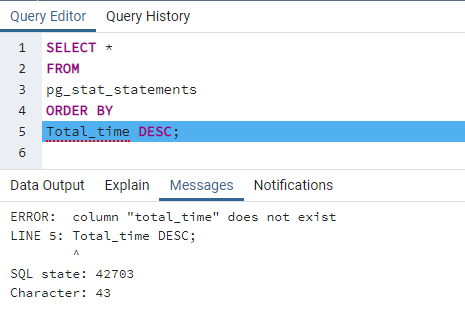PostgreSQL 13 pg_stat_statements
Overview
Today, we will discuss, how to configure pg_stat_statements in PostgreSQL 13 for Performance improvement strategies
The pg_stat_statements module provides a means for tracking the planning and execution statistics of all SQL statements executed by a server. The module must be loaded by adding pg_stat_statements to shared_preload_libraries in PostgreSQL. conf, because it requires additional shared memory.
Let's start
We will run below SQL Query for pg_stat_statements findings.
SQL Query (Make sure that you have opened and connected with your database using PgAdmin 4 Tool)
SQL
SELECT * FROM pg_stat_statements ORDER BY Total_time DESC;
Error Message
As we can see, it's generating an Error message with the description "ERROR: relation "pg_stat_statements" does not exist at character 17
How to resolve this Error
First of all, we have to install an Extension for pg_stat_statements for further work, so we will type the below SQL command in PgAdmin 4 Query Editor
CREATE Extension pg_stat_statements;
Now, as we can see the problem is not resolved yet, so after digging out for finding the root cause
Following PostgreSQL.conf entries are required to be added for proper functionality
Open PostgreSQL.conf and add these lines
# Configuration for pg_stat_statements
shared_preload_libraries = 'pg_stat_statements'
#compute_query_id = on
pg_stat_statements.max = 10000
pg_stat_statements.track = all
Restart PostgreSQL services from Services.msc
Now the problem is still there, what is exactly happening with this Error message.
Looking into Log File
After reading PostgreSQL documentation, i found these lines which are explaining clearly about this error message
Modify the above Query/SQL statement
SQL Query
SELECT t2.rolname, t3.datname, queryid, calls
, ( total_plan_time + total_exec_time ) / 1000 as total_time_seconds
, ( min_plan_time + min_exec_time ) / 1000 as min_time_seconds, ( max_plan_time + max_exec_time ) / 1000 as max_time_seconds
,( mean_plan_time + mean_exec_time ) / 1000 as mean_time_seconds
,( stddev_plan_time + stddev_exec_time ) / 1000 as stddev_time_seconds
, rows, shared_blks_hit, shared_blks_read, shared_blks_dirtied, shared_blks_written
, local_blks_hit, local_blks_read, local_blks_dirtied, local_blks_written, temp_blks_read
, temp_blks_written, blk_read_time / 1000 as blk_read_time_seconds, blk_write_time / 1000 as blk_write_time_seconds
FROM pg_stat_statements t1 JOIN pg_roles t2 ON (t1.userid=t2.oid)
JOIN pg_database t3 ON (t1.dbid=t3.oid) WHERE t2.rolname != 'rdsadmin'
AND queryid IS NOT NULL;
Conclusion
So in this article, we have learned how to configure pg_stat_statements in PostgreSQL 13.
Useful Links
https://github.com/prometheus-community/postgres_exporter/issues/541
https://stackoverflow.com/questions/31021174/pg-stat-statements-enabled-but-the-table-does-not-exist
https://www.postgresql.org/docs/current/pgstatstatements.html

















